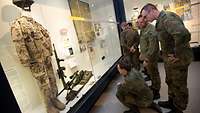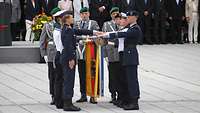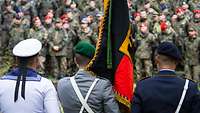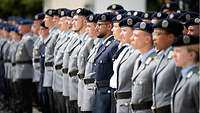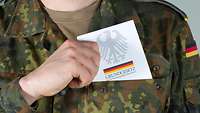The Bundeswehr’s Traditions
The Bundeswehr’s traditions create a sense of identity and unity in the forces. They are based on German history, and the values of the free democratic order will always be at their heart. The Bundeswehr’s history, which goes back more than 60 years, is the primary source of its traditions. It is the key element in the Bundeswehr’s understanding of tradition.
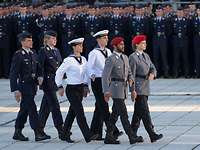
Traditions – a foundation for the armed forces
Traditions arise when we engage with our own past. At the same time, they point the way forward for our actions today and in the future. Yet Germany’s history – especially its military history – is characterised by ruptures and caesuras. This makes it harder to find traditions for the Bundeswehr. Only elements of German history that are consistent with the value system of the free democratic basic order can serve as a basis for traditions. The directive on traditions known as the “Guidelines on Tradition and the Cultivation of Tradition in the Bundeswehr” offers detailed information on this subject. These guidelines not only clarify the Bundeswehr’s relationship to the Wehrmacht and the National People’s Army, but also shift the focus to the Bundeswehr’s own history for the first time.
Cultivating traditions in the Bundeswehr strengthens awareness of its own history and pride in its achievements
Why do we need traditions in the Bundeswehr?
The intention is for the Bundeswehr’s military personnel to engage with Germany’s military history in order to develop soldierly virtues and the appropriate attitude. Traditions also strengthen their will to bear burdens and to fight when the mission requires them to. Common traditions reinforce the sense of community among all members of the armed forces – regardless of their employment category, service or other status.
Traditions also promote understanding between different generations. Shared values and examples set by figures from the past create essential unity within the forces. Traditions reflect and preserve these values. Identifying with them helps personnel to accomplish their missions and exercise command and control, which improves their combat power.
What role does the Basic Law play?
Former Federal Minister of Defence Ursula von der Leyen said that “Only a military identity that is built on the fundamental values of our Basic Law can be a source of meaning and traditions for our Bundeswehr, which is committed to liberal and democratic objectives”. The Basic Law for the Federal Republic of Germany is an essential basis for the armed forces’ understanding of tradition. It applies to all governmental actions – and therefore also to the armed forces. The Legal Status of Military Personnel Act, for example, reflects the fundamental role of the Basic Law.
The values and standards described in the Basic Law are binding. They include respecting human dignity, the rule of law, democracy and the separation of powers, as well as the obligation to support freedom and peace. For military personnel, that means respecting human dignity even in combat. At the same time, the Guidelines on Tradition and the Cultivation of Tradition in the Bundeswehr also emphasise the fact that the values enshrined in the German constitution are much older than the Basic Law itself. This means that elements worthy of being commemorated and preserved from all epochs may be adopted into the Bundeswehr’s traditions.
What is worthy of becoming a tradition?
As a general rule, all historical examples of bravery, honour, decency, loyalty, modesty, comradeship, truthfulness, decisiveness, conscientious performance of duty, and military excellence can serve as a basis for traditions. Outstanding achievements in military prowess such as excellent command and control of armed forces or mastery of weapon systems may be recognised in doctrine and training. However, they are never considered independently of the historical, social and political ends they served.
Military professionalism and skills alone are not an adequate basis for Bundeswehr traditions. While the Bundeswehr may recognise historical examples of soldierly virtues, these examples must always be considered in their historical context and in relation to the intentions and convictions on which they were based.
Why is the Wehrmacht unworthy of being part of our traditions?
The Third Reich has no place in the Bundeswehr’s traditions. As an instrument of the Nazis’ reign of terror, the Wehrmacht was also involved in crimes during World War II. This is true of all units, armed services, the military administration and the armaments sector. For the Bundeswehr, professional combat skills can only serve as a basis for traditions if they are linked to the values of the free democratic basic order. This means that individual members of the Wehrmacht may well be included in the Bundeswehr’s traditions. Before that happens, an extensive review of the individual figure in question is carried out. The Bundeswehr carefully examines whether this person was involved in crimes and to what extent their achievements seem exemplary and meaningful in this day and age.
What about the National People’s Army?
The National People’s Army was the army of East Germany. No part of it merits being preserved in traditions: through its identity as the army of the SEDSozialistische Einheitspartei Deutschlands party, it served to secure the power of the East German dictatorship. However, individual former members of the National People’s Army may serve as the basis for traditions.
Traditions are not history, but rather a set of deliberate and meaningful selections from it.
What about resistance – can that be a worthy part of our traditions?
Obedience and the performance of duty are important military virtues, but they have their limits. These virtues no longer apply if they would result in violation of key values of the Basic Law. In particular, these values include respecting human dignity, observing the rule of law and international law, rejecting any despotism or tyranny, and commitment to freedom and peace. The members of the military resistance involving Colonel Claus Schenk, Count von Stauffenberg exhibited an exemplary soldierly and ethical attitude in German (military) history. On 20 July 1944, they actively opposed the Nazi regime and demonstrated their courage, risking their lives and putting their families in danger. They wanted to stop millions more from being killed.
Why do traditions need symbols?
The Bundeswehr’s traditions are also reflected in its symbols. For example, the national colours – black, red and gold – stand for democracy. For military personnel, the national anthem is an expression of preserving unity, justice and freedom. The Iron Cross and the various versions of the Badge of Honour of the Bundeswehr stand for bravery, honour and a love of freedom. Military customs and ceremonies also support the cultivation of tradition in the Bundeswehr. The official oath and solemn pledge of soldiers are a symbolic and public affirmation of their commitment to loyally serving the Federal Republic of Germany and bravely defending the rights and freedom of the German people.
Where do the Bundeswehr’s traditions come from?
The Bundeswehr’s traditions are primarily drawn from the past 64 years. The accomplishments of military personnel, civilian employees and reservists play a key role in the Bundeswehr’s understanding of tradition. All of these people have successfully protected the German population. Other important elements in traditions include the concept of leadership development and civic education with its guiding principle of citizens in uniform; success in international crisis management and as an alliance army, and the Bundeswehr proving itself on operations and in combat. Honouring and building on all of this heritage is the responsibility of all Bundeswehr personnel.


